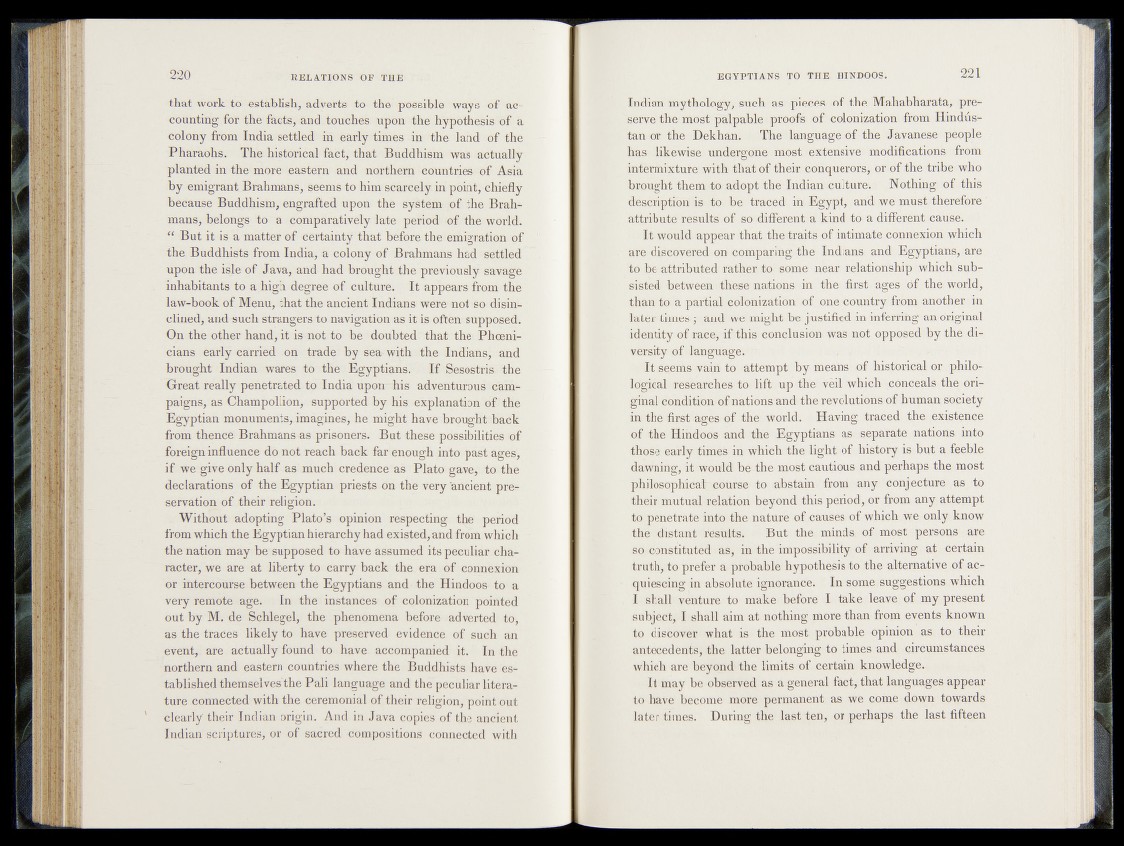
that work to establish, adverts to the possible ways of accounting
for the facts, and,touches upon the hypothesis of a
colony from India settled in early times in the land of the
Pharaohs. The historical fact, that Buddhism was actually
planted in the more eastern and northern countries of Asia
by emigrant Brahmans, seems to him scarcely in point, chiefly
because Buddhism, engrafted upon the system of the Brahmans,
belongs to 'a comparatively late period of the world.
“ But it is a matter of certainty that before the emigration of
the Buddhists from India, a colony of Brahmans had settled
upon the isle of Java, and had brought the previously savage
inhabitants to a high degree of culture. It appears from the
law-book of Menu, that the ancient Indians were not so disinclined,
andrsuch strangers to navigation as it is often supposed.
On the other hand, it is not to be doubted that the Phoenicians
early carried on trade by sea* with the Indians, and
brought Indian wares to the Egyptians. If Sesostris- the
Great really penetrated to India uporHhis adventurous campaigns,
as Champollion, supported by his explanation of the
Egyptian monuments, imagines, he might have brought back
from thence Brahmans as prisoners. But these possibilities of
foreign influence do not reach back far enough into past ages!,
if we give only half as much credence as Plato gave, to the
declarations of the Egyptian priests on the very ‘ancient pre~-
servation of their religion.
Without adopting Plato’s opinion respecting the period
from which the Egyptian hierarchy had existed, and from which
the nation may be'supposed to have assumed its peculiar character,
we are at liberty to carry back the era of connexion
or intercourse between the Egyptians and the Hindoos to a
very remote age. In the instances of colonization pointed
out by M. de Schlegel, the phenomena before adverted to,
as the traces likely to have preserved evidence of such an
eventr: are actually found to have accompanied it. In the
northern and eastern countries where the Buddhists have established
themselves'the Pali language and the peculiar literature
connected with the ceremonial of their religion, point out
clearly their Indian origin. And in Java copies of the ancient
Indian scriptures, or of sacred Compositions connected with
Indian mythology, such as pieces of the Mahabharata, preserve
the most palpable proofs of colonization from Hindustan
or the Dekhan. The language of, the Javanese people
has likewise undergone most extensive modifications from
intermixture with that of their, conquerors; orto£>the tribe who
brought them-to adopt the . Indian culture. Nothing of this
description is to be traced in Egypt, and we must therefore'
attribute results of so differentia kind to1 a different cause.
It would appear that the traits of intimate;connexion which
are discovered on conaparjhg the Indians and Egyptians; are
'to be attributed rather to some near relationship which subsisted
between these nations in the first* agesv'of the world,
than to a partial colonization fo£ one'country from another in
later dimes ; and we might be justified in inferfihg aB|4$lgihal
identity of race, if this conclusion was not opposed ;by the di-
versity of language.
It seems vain to attempt by means, of historical or philological
researches to lift up the veil which conceals the original
condition of nations and the revolutions-of human society
in the first ages of the world. Having traced the existence’
of the Hindoos and the Egyptians as separate nations into
those early times in which the light of history is but a,feeble
dawning, it would be the most cautious and perhaps the most
philosophical: course to abstain from any conjecture as. to
their mutual relation beyond this period, or from any attempt
to penetrate into the nature of causes of which we only know
the distant results. But the minds, of most persons are
so constituted as, in the impossibility of arriving at certain
truth, to prefer a probable hypothesis to the alternative of acquiescing
in absolute ignorance. In some, suggestions which
I shall venture to make before I take leave; of my present
subject, I shall aim at nothing more than from events known
to discover what is the most probable opinion as to their
antecedents, the latter belonging to times and circumstances
which are beyond the limits of certain knowledge.
It may be observed as a general fact, that languages appear
to have become more permanent as we come down towards
later times. During the last ten, or perhaps the last fifteen